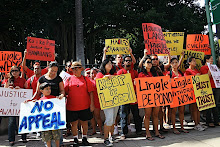The Associated Press, via Maui News has an article that shows the riff between Democrats in the State House of Representatives and the relevance of that riff to the ceded lands issue.
Early into the article, House Speaker Calvin Say is identified as the reason why House bills designed to protect the ceded lands did not move forward. The article states, "Reps. Scott Saiki, Mele Carroll and Faye Hanohano, all Democrats, said it appears that House Speaker Calvin Say does not want the bills to progress . . . ." But the article does not end there. It further suggests that there is some sort of political "ping-pong" action going on. The AP article suggests that one politician points to another politician, who then either points back to the first politician or to a third politician. In the end, the ping-ponging however goes on between House committee chairs generally and the Speaker of the House, Calvin Say. Here's what the article also says,
"Saiki said the chairman of House Water, Land and Ocean Resources Committee (pictured left, Rep. Ken Ito), where the three bills are waiting after winning approval from Carroll's panel last week, has indicated that there will be no hearing on the measures any time soon."
The article also reports that, "A call for comment from Say was referred to House Majority Leader Blake Oshiro, who said that because the bills were referred to four committees, there is no way to complete the legislative process in time for the Supreme Court's oral arguments Feb. 25."
But the article also reports that perhaps it's the House Speaker, Calvin Say who decides which bills get heard. "Carroll said she asked Ito when his panel would hear the measures, and Ito replied that he'd have to check with Say." In one of our own meetings with Calvin Say, he told us that it was up to the individual committees as to which bills get heard in committee. If Representative Say is under the impression that Rep. Ken Ito is deciding which bills are being heard in Ito's committee, and Ito is under the impression that Say is going to tell him which bills to hear in Ito's committee, then it seems like someone doesn't know what the other is doing. Hopefully, this type of process is not indicative of how our state House of Representatives works.
Bills and Resolutions.
The Senate Bill (SB 1677) introduced by Senate President Colleen Hanabusa was passed out of the Senate today. SB 1677 however, is not a moratorium bill. Senate Bill 1085 is a moratorium bill, even after its amendments. Senate Bill 1085, started off as a full-moratorium bill that re-affirmed the Hawaii Supreme Court's landmark ruling last year. The amended version has a limited 5 year moratorium and then after the expiration of 5 years, a two-thirds vote is necessary. Both the Honolulu Advertiser and the Honolulu Star-Bulletin report today on the Senate's passage of SB 1677.
From here SB 1677 will now go to the House of Representatives. We presume that it will start off in the House Hawaiian Affairs Committee, then be also be referred to the same committees that the other moratorium bills were referred to. BUT, we hope that we're wrong.
What has not been reported in the two Honolulu dailies is that, the Senate today passed two resolutions. Senate Resolution 25 and Senate Concurrent Resolution 40.
These two resolutions urge the Governor to withdraw and establish that the senate (or Legislature for SCR 40) policy is to support the Hawaii Supreme Court's decision from January 31, 2008.
Not surprisingly, the two lawmakers who voted against the resolutions were Senators Fred Hemmings and Sam Slom.
Resolutions are not binding, but they do express the policy of the legislative body. it could be used to demonstrate to the U.S. Supreme Court that the government of the State of Hawai'i is actively dealing with the claims of Native Hawaiians.




No comments:
Post a Comment